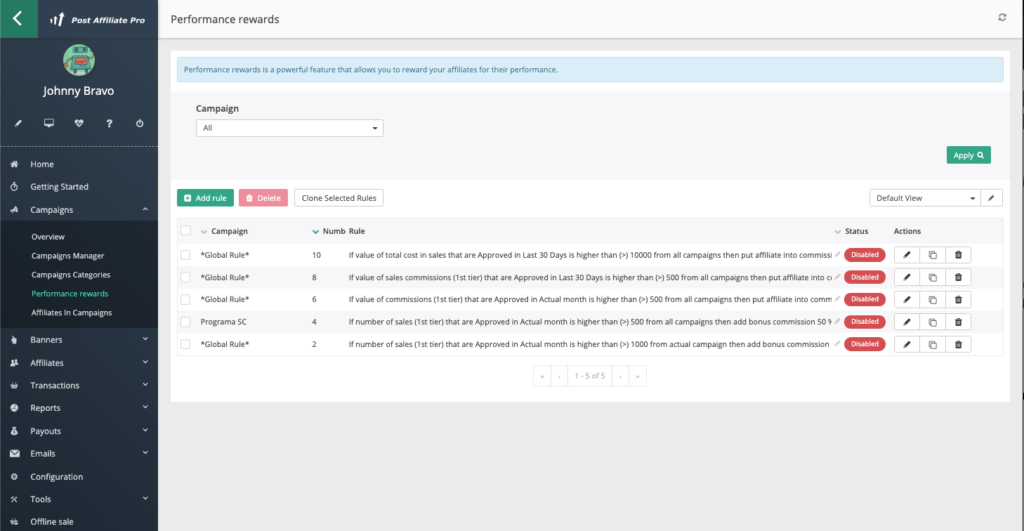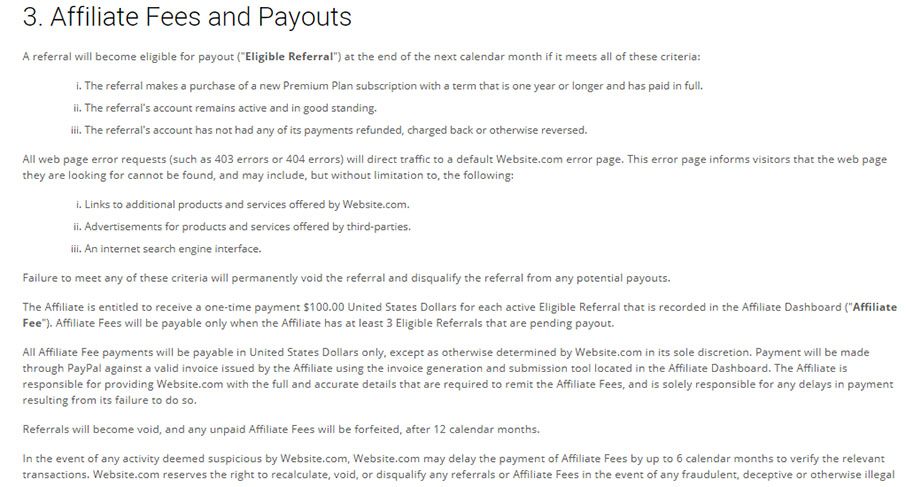Affiliate marketing has taken the advertising world by storm over the past decade. It has shaped most digital marketplaces and is quickly becoming one of the most popular strategies to promote products and services.
An affiliate marketing agreement is a contract between a company and another party, known as the affiliate. The affiliate agrees to market the product and will be paid a commission for each product they sell online. An affiliate agreement is critical to your company. It should protect you against any possible lawsuits, affiliate fraud, and unethical third-party marketing.
With this understanding, you may ask, “what should a comprehensive affiliate agreement cover?”. Whether you use an affiliate agreement template free for businesses or write your agreement from scratch, here are the things you need to see in your final contract with your affiliate marketer:
1. Cover all legal bases
Every affiliate marketing agreement is a legal document. Whenever you start a company, one of the top tips to start a business you will find is that you need to protect yourself legally if something happens. Your affiliate agreement should be comprehensive enough to cover intellectual property rights, disclaimer, and privacy policy, among other things.
Any good affiliate contract must specify government regulations. Your agreement must especially ensure Federal Trade Commission (FTC) compliance. Make sure it states that your affiliates receive compensation and that such a promotion is undertaken with transparency. Failure to state the above is an FTC breach. Your company will be held accountable for the breach and not the affiliate.
Ensure your company is not on the receiving end of legal action due to a copyright breach. You need to see a copyright clause in your affiliate agreement. This section should state how you want your brand to be presented in the market and the type of content your affiliates are allowed to use.
Ensure that your affiliates respect copyrighted content when promoting your products. You can do that by letting affiliates know of the penalties they could pay for violating the terms of the contract.
Remember, you don’t want to end up like Samsung, Apple, and Microsoft, which have been at the receiving end of copyright-related suits for decades.

A copyright breach could mean legal repercussions for your company. In case of such a breach, you may have to pay legal fees if you go to court
2. Coupons and discounts
The choice of whether or not your company accepts coupon affiliates is an important one to make. Whichever you choose, you should make it clear in your affiliate agreement template and final contract.
Coupons are best used in highly competitive digital markets such as those which sell beauty products, clothing, and other similar products. Select a group of high-quality affiliates to work with to make the most of your coupon affiliate marketing strategy.
Include a clause in your contract that specifies that alterations to discounts and coupons are prohibited. The contract can include other prohibitions, as well.

FatCow, a provider of shared web hosting solutions, for instance, does not allow affiliates to post coupons or discounts without prior written consent. Any modifications to the coupons or discounts made available to affiliates through the affiliate marketing program are also clearly prohibited by the company.
If you want a similar clause in your contract, make sure your final agreement also specifies such acts are affiliate agreement compliance issues that will be dealt with accordingly.
3. Terms regarding other affiliations
Affiliate marketers usually choose to join several affiliation programs to earn more money. However, this is not recommended in most cases, especially if they work for direct competitors.
Companies can (and should) restrict the affiliate programs a marketer can join. After all, even though affiliates are free to promote any company, allowing them to sell the products of your direct competitors will hurt both your competitor and your brand.
Ideally, your affiliate agreement should also include a clause classifying aligning with a brand whose values are in opposition to your own as a compliance issue. That’s an essential clause because it can help protect your reputation in the long run.
Just to illustrate how important this is, here’s a hypothetical scenario. Let’s say you’re a brand that values children’s rights. Suppose your affiliate marketer starts promoting the products of another brand known to employ children in sweatshops. In that case, you might be accused of hypocrisy for working with such an affiliate marketer.
A contract with a clause banning affiliate marketers from such affiliations can help prevent this scenario. The contract may also state that a breach of the ban can lead to contract termination.
4. Promotional methods
There are many ways affiliates can promote your products and services: through blog posts, social media posts, bulk emails, or even word of mouth. However, you want to ensure their methods are in line with your overall operating procedures. You do not want to compete with your affiliates.

For instance, affiliates may use paid advertising like Google Ads or Facebook with their own referral links. Whereas this could generate more leads, it comes at a cost. Your affiliate or content creator will be in direct competition with your company trying to reach the same customers. As a result, the cost per click increases.
The best way to avoid this undesired competition is to have a clause specifying the promotional methods affiliates can use. Email marketing, for instance, can be stated in the contract. Additionally, blogging can be included since it’s a very effective marketing tool for affiliate marketers.
The contract can also specify which tools affiliate marketers can use. For instance, it could recommend email marketing and the best blogging tools. Including such a clause can help give affiliate marketers an edge over others competing for the same audience’s attention.
The more detailed your promotional methods clause, the better. Check out this example from Dinnerly. Note that the brand was very explicit in its acceptable affiliate promotional methods:

Take time to check out and review the policy adopted by Walmart as well. It addresses not only general prohibitions but also electronic communication and trademark prohibitions. For instance, the use of Wal-Mart trademarks in paid search keywords, ad copy, display URL, emails, or text messaging is explicitly prohibited.
Make sure to see guidelines stating where affiliates can promote and share referral links in your affiliate agreement. You could choose to prohibit any promotion through paid ad channels outright. You could also only limit the use of paid ads, for example, by only banning the bidding against branded keywords. Whichever the case, overlooking this section of the affiliate agreement is one of the most costly affiliate marketing mistakes you can make.
5. Include an update clause
Your affiliate agreement template should state how you’ll keep the contract updated. That offers both parties the opportunity to renegotiate previous contractual clauses.
The recommended agreement review timeline is once every year (annually). You can automate this updating process with HR software, which helps companies like yours to administer and organize employee payrolls, records, and the like.
Update your affiliate program agreements from time to time to ensure everyone is on the same page. Remember, you can’t just implement a new policy just because you said so. The new policy needs to be explicitly stated in the contract. Take note, though, that when you make changes to the contract, it is also equally vital that you verbally communicate all changes with your affiliate partners.
The best way to save time is to use a free affiliate agreement template. In this way, you don’t have to rewrite the entire affiliate agreement every time you make an update.
6. Affiliate’s business structure
There are several types of affiliate marketers with various business operations. However, all affiliates generally have to choose between two types of business structures when looking to promote a brand. These are:
Sole proprietorship
Under this structure, the affiliate’s legal name is their business’s legal name. They can, however, choose to run their promotional business under a different name. That appears in most legal documents as “Doing Business As” (DBA). In most countries, affiliates are required to file a formal application to operate as a DBA.
Limited liability company
This business structure allows the affiliate to operate as a separate entity from their legal name. They allow affiliates to avoid being held personally responsible for business-related mishaps.
You should see a clause stating your affiliate’s business structure in the affiliate agreement. That will come in handy in case a lawsuit situation arises. You’ll know from the get-go how to craft your complaint against the affiliate business.
7. Bonus structures
Bonus commissions act as incentives to encourage affiliates to work harder. The technique rewards affiliates who sell more products than they were contractually obligated to sell. That will push affiliates to go the extra mile, which can translate to more product sales.
Bonus structures are common. Here are the three main factors to consider when crafting one.
- Amounts – This appears as either a percentage-based bonus or a fixed bonus commission.
- Time – This states the amount of time affiliates have to reach the target goal. You are free to set your specific time period, but it is recommended to go for a fixed time period like a week or a calendar month.
- Bonus tiers – These are the different bonus amounts awarded when affiliates reach different goals. They differentiate bonuses according to conversion rate. For example, if an affiliate sells ten more items than expected, they should not be awarded the same commission as another selling 30 more products.
In Post Affiliate Pro, a performance rewards feature allows you to automatically check when an affiliate reaches a specific number of sales, and at what time and reward them accordingly. By adding bonus commission or assigning the affiliate to a different commission group with a higher commission amount. If you let Post Affiliate Pro monitor your affiliates’ performance for you, you won’t need to do anything; just set up the rules, and it will do the rest.

An agreement that specifies your bonus structures will help motivate your affiliates to sell more while ensuring they get the fair treatment they deserve after all their hard work. You should also include the requirements to earn commission and any commission disqualifications in the agreement. That will make it easier for you to handle a situation when an affiliate comes with a complaint about bonuses.
8. Payment policies
Affiliate program payment terms are vital. They determine both your financial obligations and amounts payable to your affiliates. They also determine how potential affiliates will see your program. Affiliate marketing programs are primarily chosen by publishers based on the commissions they receive.
It is therefore vital to make sure that these policies take into account both the interests of merchants and their affiliates. The aspects that you should see in the payment policy section include:
- Payment models
- Payouts
- Incentives
- Locking period and reversals
Your affiliates need to know what methods you use to track and process payments, the value of the commissions you pay for each qualifying action, and how and when you make payments. Website.com uses a referral model in their affiliate agreements with affiliates, as seen in the screenshot below. They have openly stated their payment terms for all affiliates to see.

If you can, check out the types of bonuses your competitors give when crafting your agreement and offer better ones. You need a competitive edge, so affiliates will opt to work with you.

In Closing
An affiliate agreement is a contract between a company and another party, known as an affiliate. Similar to a business contract, an affiliate agreement is vital.
A solid agreement should cover all the legal bases and specify your coupon and discount policy. It should also specify your terms regarding other affiliates, promotional methods, bonus structures, and payment policies. The agreement should also state your affiliate’s business structure and an update clause.
As a final tip, I suggest you use an affiliate agreement template free for businesses to create your contract. Just make the necessary changes to the template. That can help save you a lot of time. Once done, read the final document. If you find all these things in the final contract, then you can rest easy your affiliate program will run smoothly.
Frequently Asked Questions
Do I need an affiliate agreement?
It depends on the nature of your business and your relationship with your affiliates. An affiliate agreement can help to outline the terms and conditions of your partnership and protect both parties involved. It's generally a good idea to have an affiliate agreement in place to prevent any misunderstandings or disputes in the future.
How do I make an affiliate contract?
How do I make an affiliate contract?
To create an affiliate contract, outline partnership terms, including commission rates, payment schedules, and marketing guidelines. Consult a legal professional for a legally binding agreement that safeguards both parties' interests. Include termination, confidentiality, and dispute resolution clauses. Review and sign the contract to formalize the agreement.
Do I need an affiliate agreement?
It depends on the nature of your business and your relationship with your affiliates. An affiliate agreement can help to outline the terms and conditions of your partnership and protect both parties involved. It's generally a good idea to have an affiliate agreement in place to prevent any misunderstandings or disputes in the future.
Share this article
Affiliate marketing email templates
Discover expertly crafted email templates for affiliate marketing with Post Affiliate Pro. Enhance your communication by motivating, acknowledging, and engaging affiliates effectively. From terms and conditions to product launches, these templates ensure clear and consistent messaging to boost your affiliate program's success. Visit now to streamline your affiliate communication!
How To Find Affiliates to Sell Your Products
Discover over 10 successful strategies for finding high-quality affiliates in 2024 to boost your product sales. Learn to leverage influencers, join affiliate networks, and enhance your reach through SEO and social media. Maximize revenue with transparency and ongoing monitoring in your affiliate marketing program.









